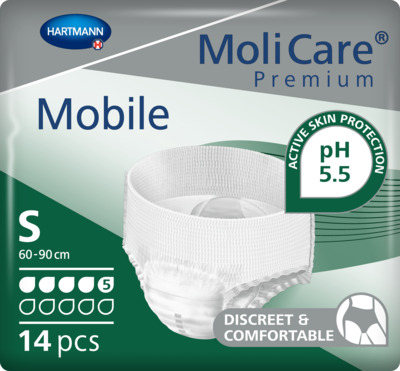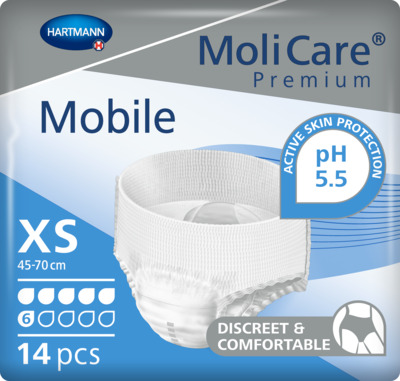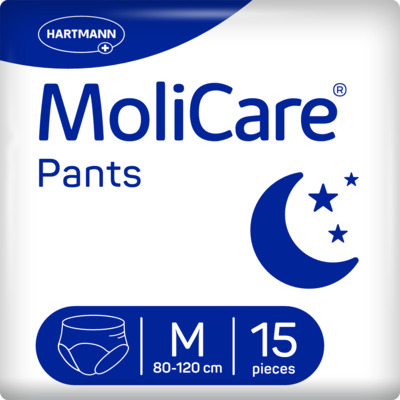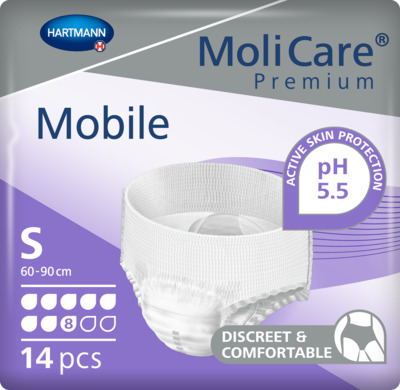Incontinence Advice
How To Avoid Urine Smells In Pants And Incontinence Odours
Incontinence can lead to unpleasant urine odours, affecting confidence and daily life. In this article, we will offer practical tips on how to stop and avoid urine smells in pants as well as incontinence odours. Learn how to stop urine smelling through proper hydration, hygiene practices, dietary adjustments, and using the right continence products. Discover effective methods to stop smelling of urine and ensure a fresher, more comfortable environment for family members or for those living in care.

What Causes Urine to Smell Bad?
Urine is usually clear or pale yellow with a mild smell (view our guide on what the colour of your urine could mean for more info). However, certain factors can make your urine smell stronger:
Dehydration: Not drinking enough fluids can lead to dehydration, resulting in concentrated urine that appears dark yellow and has a stronger odour; this can be provoked by alcohol. It is crucial to stay well-hydrated by consuming around six to eight glasses of water daily. Proper hydration helps dilute urine, making it less likely to produce a strong smell.
Diet: Certain foods and drinks, such as asparagus and coffee, are known to produce a more potent and distinctive-smelling urine. Additionally, some medications, including vitamin B6 supplements, can alter the odour of urine.
Infections: Bladder infections, also known as urinary tract infections (UTIs), can cause foul-smelling urine. If you notice a strong or unpleasant odour, it is advisable to consult your GP for a proper diagnosis and treatment. Untreated infections can lead to more severe health issues. You can learn more with our advice on the fastest way to get rid of a bladder infection.
Medications: Certain medications can change the colour and odour of urine. If you notice changes after starting a new medication, discuss it with your healthcare professional to understand the possible effects.
How to avoid urine smell in pants
Understanding how to avoid urine smell in pants is crucial for maintaining confidence and comfort. Here are some common causes and solutions:
Bacterial Vaginosis: Bacterial Vaginosis (BV) can upset the natural pH balance, causing an unpleasant odour. Symptoms include a fishy smell with grey/white watery discharge, especially after sex. It’s important to seek medical advice to manage and treat BV effectively.
Urinary Tract Infection: UTIs can cause very strong-smelling urine and are often accompanied by frequent urination and a burning sensation. If you suspect a UTI, contact your doctor for antibiotics to clear the infection.
Menopause: During menopause, a decrease in oestrogen and thinning of the vaginal wall can lead to minor urine leaks, causing ammonia build-up in underwear. Proper hygiene and wearing absorbent products can help manage this.
Incontinence: Incontinence, whether urge or stress incontinence, can result in urine leaks onto your pants, causing an ammonia smell. Using incontinence pads or underwear designed to neutralise odours can significantly help.
Pregnancy: Early pregnancy can cause changes in urine smell due to dietary changes and hormonal fluctuations, leading to pregnancy and incontinence. These changes can lead to pants smelling of ammonia. Staying hydrated and maintaining good hygiene can help manage this alongside our incontinence products for women.
Dehydration: Dehydration is a simple but common reason for strong-smelling urine. Ensuring you drink enough water throughout the day can help dilute urine and reduce its odour. Cranberry juice can also bring many benefits to your diet and improve the acidity of your urine as well as naturally reducing odour.
Sweat: Sweat, particularly from the apocrine glands in the groin area, can mix with urine, creating a stronger smell. Keeping the area clean and dry, and wearing breathable fabrics can help minimise this.
Washing Routine: Improper washing routines can cause ammonia to build up in your underwear. Washing in cool or cold water, using short wash cycles, or inappropriate detergents can exacerbate the problem. Washing urine-stained pants in warm water with suitable laundry detergent can help remove odours effectively.
Diet: This can have a big impact on how urine is passed through the body and the smells it may emit. Drinking 6-8 cups of water can aid in managing fluids in the body alongside other bladder-friendly drinks, and looking to consume more vitamin C. We also offer advice on bladder cleansing foods, as well as foods and drinks that irritate the bladder and bowels, to aid in a healthier lifestyle, especially for over 50s.
It’s important to be aware of how to stop urine leakage when coughing, which can lead to further urine smells in pants, provoking incontinence odours.
How to use protective clothing and skin care against urine leaks
Keeping control of odours involves good personal hygiene practices and using clean products. Cleanse the area after each pad or absorbent product change, use MoliCare Skin Moist Wipes or our skin care range to ensure the area is dry. Standard body washes can be harsh on intimate areas or even create irritation, so it is important you use a product that is specifically designed for intimate care.
If the skin becomes dry or develops redness, use a barrier cream to keep the skin in good condition.
What incontinence products to wear?
MoliCare brand pads, net and fixation pants and using incontinence sheets for beds at night all contain odour neutralisers to prevent odours. It’s not recommended to wear products that are fragranced as these will mask or even mix with the smell of urine, potentially making it worse. If you wear absorbent products, there are steps you can take to effectively combat odour.
- Ensure that urine and stools are contained inside the pad. If you experience leakages or if the pad becomes saturated within a few hours, consider a higher absorbency product, and ensure you are wearing the correct fit. Follow our fitting advice and videos on HARTMANN Direct to ensure leakage is avoided. Visit our YouTube channel and find how-to guides for our products.
- You can dispose of soiled incontinence pads correctly inside an airtight bag to prevent smells from escaping and place them in the appropriate disposal unit. Many public toilets will also have facilities for disposing of hygiene products when out shopping or in cafes.
How to get rid of smelly urine in furniture and clothes
Here are some different ways in which you can get rid of odours and incontinence smells caused by urine leaks in clothing, furniture, and more:
Clothing and/or bed lining
In the event of stool or urine staining your bed linens or clothing, wash them as soon as you’re able to, to avoid them lingering too long on fabric, as this can make it even more difficult to eliminate later. If you rely on assistance from someone else to manage your laundry or need to visit a laundromat, we advise you to store soiled items in an airtight bag until they can be washed.
To address incontinence smells in clothes and linens, adding white vinegar to the wash water can be highly effective. When washing, mix 1 cup of white vinegar together with 3 cups of water and allow the clothing to soak within the mixture for a couple of minutes. Wash the clothes in lukewarm water, followed by detergent, and launder them as you typically would. When using white vinegar in the water, ensure you rinse once or twice with cold water.
Keep in mind that clothing made entirely of 100% polyester may pose challenges in removing persistent odours. In some cases, consider wearing cotton instead.
Ventilation:
Remember to think about air circulation in your surroundings too, such as opening windows or doors to let fresh air in. Use air fresheners that will effectively neutralise incontinence smells and odours, rather than a strong perfume scent.
Furniture or carpet?
Before applying a cleaner, be sure to blot the stain gently, aiming to absorb as much of the liquid as possible. Once the excess liquid is blotted, you can proceed to apply a cleaner. Vinegar is a natural and effective option for various surfaces, including furniture, but you should test the cleanser first in an inconspicuous area before using it on the stain.
For leather surfaces, consider using a mixture of a small amount of dish soap and water instead of vinegar. Some leathers may experience drying effects from the acid in vinegar.
It's not uncommon for individuals to be unaware of the presence of incontinence smells. If you experience incontinence, you should ask someone that you trust to inform you if they detect any odours in your surroundings. Remember: you are not alone with incontinence!
While it may be tempting to relax certain cleaning habits when confined indoors, you still need to maintain your regular personal hygiene routines to avoid potential skin conditions or unpleasant smells associated with incontinence.
Consulting a healthcare professional
As soon as urine leaks and odours become noticeable, it is integral to consult a healthcare professional for the best advice, even more so if there is blood in urine. They can underline the potential cause of the odours and implement appropriate dietary changes, as well as what products will be best to control smelly urine. This may involve a more thorough examination to check for UTIs in case there is damage to the kidneys or other internal organs.

Prevent urine leaks and incontinence odours
By using these tips to eliminate urine leaks and incontinence smells, you will gain confidence of managing incontinence alongside MoliCare incontinence pads. Maintaining good hygiene practices, staying hydrated, replacing undergarments daily, switching to cotton, and keeping on top of cleaning around the home will all help to reduce the risk of incontinence smells.

FAQs
Why does incontinence sometimes have an odour?
Incontinence can result in odour due to the breakdown of urine, the presence of bacteria, and prolonged exposure to moisture. These factors can contribute to the development of unpleasant smells.
How can I control odour associated with urinary incontinence?
There are several strategies to control incontinence odours, including maintaining good personal hygiene, using odour-neutralising pads and pants, implementing lifestyle modifications, and seeking GP advice when needed.
What personal hygiene practices can help control incontinence smells?
Good personal hygiene is essential. Cleanse the genital area regularly using MoliCare Skin products specifically designed for intimate care, and dry the area after to minimise moisture and bacterial growth.
How can I manage incontinence odours in public settings?
To manage odours in public or social situations, carry disposal bags with you and use the hygiene bins provided in public toilets. You may find a toilet card helpful. The ‘Just Can’t Wait’ card states that you have a medical condition and that you need to use the toilet urgently. Showing this card can help you avoid the queue for a public toilet.
Sources

MoliCare® Premium Mobile 5 Drops
<h2>MoliCare Premium Mobile 5 Drops: The Solution for Incontinence</h2> <p>Experience the ultimate solution for managing moderate to very severe incontinence with MoliCare® Premium Mobile 5 Drop incontinence pants. These innovative pull-on pants provide the look and feel of ordinary underwear, ensuring discreetness and exceptional protection.</p> <p>With your comfort and security in mind, the discreet and adaptable design of MoliCare® Premium Mobile pants conforms to the shape of your body.</p> <p>The pH-balanced formulation ensures effective skin protection, preserving the natural balance and health of your skin. Featuring a three-layer absorbent core, these pants lock away urine, providing dryness and ensuring you stay comfortable and confident. The anti-leakage system offers extra security and protection, preventing any leaks or accidents. Odour neutralisers are added to provide long-lasting freshness and confidence, eliminating unwanted odours.</p> <h2>High Absorption Capabilities</h2> <p>MoliCare® Premium Mobile 5 Drop pants provide superior absorption capabilities, making them the perfect choice for managing moderate incontinence. With varying levels of absorbencies available, you can choose the one that suits your specific needs. The breathable fabric, anatomical shape, and absorbent core keep moisture away from your body, keeping your skin dry. Enjoy the convenience of easy removal with the quick tear-open sides of MoliCare® Premium Mobile pants, which is even suitable for those with severe bladder weakness!</p> <h2>Choosing your Size</h2> <p>Measure waist at the largest width between the waist and hips. Select the product size based on the below sizing.</p> <p>Small: 24-35 inches (60-90cm)</p> <p>Medium: 31-47 inches (80-120cm)</p> <p>Large: 39-59 inches (100-150cm)</p> <p>Extra Large: 51-67 inches (130-170cm)</p> <p>Fast, reliable delivery service for all your essential <a href="https://www.hartmanndirect.co.uk/" style="color:#0563c1; text-decoration:underline">HARTMANN Direct</a> incontinence products straight to your door. Take advantage of our convenient online ordering system and benefit from our price match promise, along with free delivery on orders over £50. Our friendly customer service team is here to assist you in selecting the right product for your needs.</p> <p> </p>
MoliCare® Premium Mobile 6 Drops
<h2>Discreet and comfort</h2> <p>Say goodbye to worries about unpleasant odours. Our Premium Mobile 6 drop incontinence pants are equipped with odour neutralisers, ensuring long-lasting freshness and confidence, so you can go about your daily activities with assurance.</p> <p>Experience superior absorption with our pull-on disposable pants in Premium Mobile 6 drop, which serve as a reliable and convenient solution for managing moderate to very severe incontinence. The discreet underwear-style fit offers you the freedom and flexibility you desire, while delivering unmatched dryness and comfort.</p> <p>Crafted from breathable fabric, the anatomical shape and three-layered absorbent core effectively keep moisture away from your body, ensuring a calm and dry sensation for your skin. The two-part cuffs act as a powerful shield against leakage, while the odour neutralisers keep any unwanted odours at bay, allowing you to live your life to the fullest.</p> <p>Removing the pants is a breeze, thanks to the quick tear-open sides, making them easier to use and convenient. Rest assured, our Premium Mobile 6 drop pants are effective even for very severe bladder weakness, providing the utmost protection you need.</p> <h2>Choosing your Size</h2> <p>Measure waist at the largest width between the waist and hips. Select the product size based on the below sizing.</p> <ul> <li>Extra Small: 18-28 inches (45-70cm)</li> <li>Small: 24-35 inches (60-90cm)</li> <li>Medium: 31-47 inches (80-120cm)</li> <li>Large: 39-59 inches (100-150cm)</li> <li>Extra Large: 51-67 inches (130-170cm)</li> </ul> <p>For further assistance, do not hesitate to contact our team today at 0800 028 9470, and be sure to order your MoliCare Premium Mobile 6 drop pants today.</p>
MoliCare Pants for Night
<h2>Incontinence pants for protection at night </h2> <p>Don’t let incontinence disturb your sleep. MoliCare® Pants Night is the simple and affordable solution for reliable protection at night. </p> <p>MoliCare® Pants Night incontinence pants for adults, also known as pull up panties, are worn like regular underwear and are available in sizes M and L. The absorbent core inside the incontinence pants quickly traps urine and ensures a pleasantly dry feeling on the skin even during the longer wear time at night. </p> <p>MoliCare® Pants Night help to keep intimate skin healthy by maintaining its natural pH value. At the same time, the absorbent core neutralises unpleasant odours. Soft and close-fitting double cuffs at the leg openings also prevent leakage. </p> <p>MoliCare® Pants Night are designed for reliable protection at night. You can recognise the nighttime incontinence pants by the moon on the packaging. They complement MoliCare® Pants Day incontinence pants which provide discreet protection during the day. </p> <h2>Who are MoliCare® Pants Night suitable for? </h2> <p>MoliCare® Pants Night are suitable for women and men with moderate incontinence who are looking for a reliable solution for the night. They lose up to 200 ml of urine at night and cannot always reach the toilet in time. <br /> <br /> They can go to the toilet independently or with a little help. MoliCare® Pants Night are suitable for urge incontinence. </p> <p>Highest wearing comfort and still affordable: MoliCare® Pants Night </p> <p>Thanks to fast absorption and odour-control, the incontinence pants provide reliable, comfortable protection while you sleep. MoliCare® Pants Night are extremely comfortable to wear. The soft, noiseless material means you will hardly notice the difference to regular underwear. </p> <p>MoliCare® nighttime incontinence pants are very skin-friendly. The slightly acidic pH value in the intimate area protects the skin from external contaminants such as urine. MoliCare® Pants Night help to maintain this natural pH value and protect the skin. </p> <p>You usually need no more than two MoliCare® Pants Day inco pants during the day and one pair of MoliCare® Pants Night incontinence pants for the night. This gives you a low cost yet high-quality round-the-clock supply of incontinence pants from HARTMANN Direct. </p> <h2>We are HARTMANN </h2> <p>MoliCare® is HARTMANN’s extensive range of continence care products. For over 40 years, we have been developing effective, reliable products that help people manage the challenges of living with incontinence. Our aim is to provide the right solution for every need. </p> <h2>Choosing your Size</h2> <p>Measure the waist at the largest width between the waist and hips and select the product size.</p> <p>Medium: 31-47 inches (80 – 120cm)</p> <p>Large: 39-59 inches (100-150cm)</p> <p> </p> <h2>Delivery service</h2> <p>Fast, reliable delivery service for all your essential <a href="https://www.hartmanndirect.co.uk/">HARTMANN Direct</a> incontinence products straight to your door. Take advantage of our convenient online ordering system and benefit from our price match promise, along with free delivery on orders over £50. </p> <p><strong>Need more help?</strong> Our friendly customer service team are waiting to help you choose the right product – call 0800 028 9470.</p>
